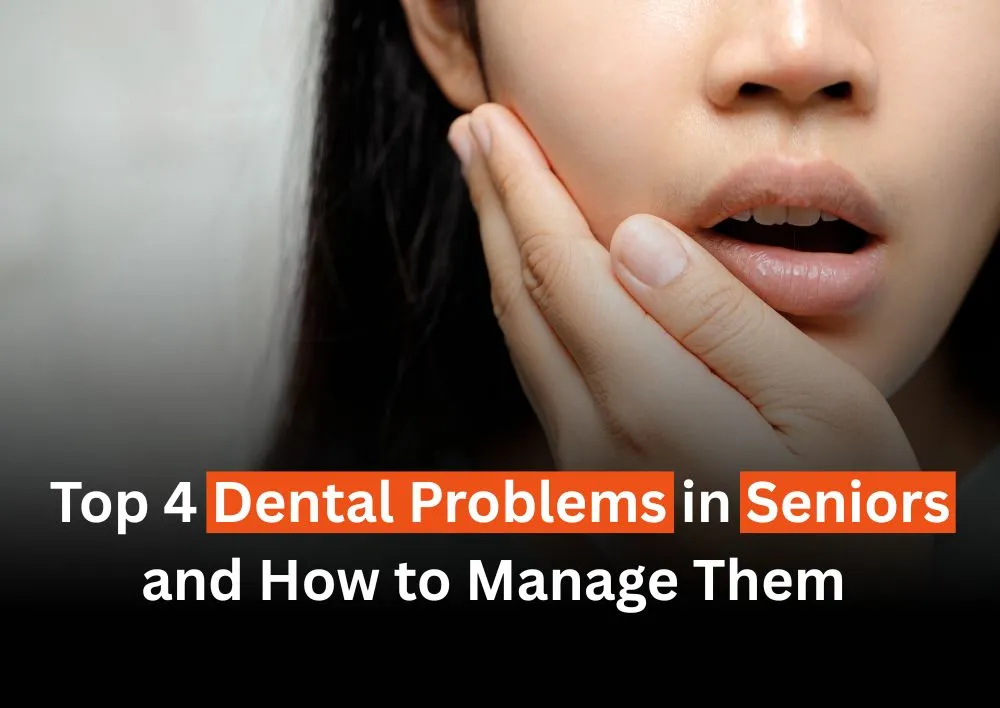Top 4 Dental Problems in Seniors and How to Manage Them
Summary: As people become old, they face dental problems such as tooth decay, gum disease, dry mouth, and tooth loss. These issues can impact daily life, from eating and speaking to overall comfort and confidence. This blog highlights the top four common dental problems in older adults and offers easy, practical solutions to manage them. With the right care, seniors can protect their oral health and maintain a happy smile.
Overview
As we age, our dental health needs change. Seniors usually experience unique challenges that can affect their teeth and gums, making good dental care more important than ever. Taking care of your smile can improve not only your oral health but also your overall well-being.
In this blog, we will explore the four most common dental problems seniors face and share simple, practical tips to handle them. Whether you are a senior yourself or caring for an elderly one, these dental care solutions can help maintain a healthy, happy smile.
1. Tooth Decay and Cavities
Many people think cavities are only for kids, but seniors are also at risk. According to the Centers for Disease Control and Prevention (CDC), nearly 96% of adults aged 65 and older have experienced tooth decay at some point. As we get older, the outer layer of our teeth (called enamel) can become thinner. Many older adults experience dry mouth due to medications or health conditions, which reduces saliva and makes their teeth more prone to cavities
According to Dr. Vishwas Bhatia, the best dentist in Gurgaon at Miracles Mediclinic "Tooth decay in seniors usually goes unnoticed until it causes discomfort. Regular dental visits and good home care are important to catch cavities early and prevent complicated treatments."
Tips to prevent tooth decay:
-
Brush teeth twice daily with fluoride toothpaste.
-
Floss once a day to remove food particles between teeth.
-
Ensure you are drinking enough water to maintain proper hydration.
-
Visit your dentist regularly for checkups and cleanings.
-
Use fluoride treatments if recommended by your dentist to strengthen enamel.
2. Gum Disease
Gum disease is a common problem among seniors. Gum disease starts with gum inflammation and bleeding (gingivitis) and can progress to serious infections that damage the gums and bone supporting your teeth, possibly leading to tooth loss. According to the research by experts at NIH , about 68% of adults over the age of 65 suffer from some form of gum problems. These diseases are also connected to other health conditions like heart disease and diabetes.
Tips to protect your gums:
-
Brush gently twice daily with a soft-bristled toothbrush.
-
Floss daily to remove plaque from between teeth.
-
Schedule professional cleanings every six months.
-
Avoid smoking, which increases gum disease risk.
-
Schedule a dental check-up immediately if you experience gum tenderness or bleeding
3. Dry Mouth
Dry mouth is a common problem for seniors, usually caused by medications or health conditions. Saliva helps protect teeth by washing away food and neutralizing acids, so less saliva means higher risks of cavities and infections.
According to research by the NIH, dry mouth is more common in older adults than in younger age groups.
Tips to manage dry mouth:
-
Drink water frequently throughout the day.
-
Chew sugar-free gum to stimulate saliva.
-
Avoid caffeine and alcohol, which dry out your mouth.
-
Use saliva substitutes or rinses suggested by your dentist.
-
Review your medications with your doctor if your dry mouth is severe.
4. Tooth Loss and Dentures
Losing teeth can affect eating, speaking, and self-confidence. Dentures are common for tooth loss, but poorly fitting dentures can cause discomfort and sores, making it hard to eat.
Tips to care for tooth loss and dentures:
-
Maintain good oral hygiene for any remaining natural teeth.
-
Clean your dentures daily with a soft brush as well as denture cleaner.
-
Remove dentures at night to let gums rest.
-
Visit your dentist regularly to check denture fit.
-
If you want a more lasting option, consider asking your dentist about dental implants.
Additional Dental Care Tips for Maintaining a Healthy Smile in Seniors
-
Eat a balanced diet rich in calcium, fruits, and vegetables.
-
Reducing sugar in your diet can help prevent tooth decay.
-
Avoid grinding your teeth or use a night guard if needed.
-
Don’t skip dental visits even if you feel no pain.
When to See a Dentist?
If you notice any of these signs, book a dental appointment soon:
-
Tooth pain
-
Tooth Sensitivity
-
Bleeding
-
Continuous dry mouth
-
Loose teeth
-
Denture discomfort
-
Difficulty chewing or swallowing
Dental treatments at an early stage can help prevent small problems from becoming serious.
Conclusion:
Seniors can keep their smiles healthy and bright by understanding these common dental issues and taking simple, effective steps to manage them. Good daily habits combined with regular dental visits help prevent many dental problems and improve overall quality of life. Don’t wait for dental problems to take a toll on your seniors' health and confidence. Schedule your senior dental checkup with the best dentist near you at Miracles Healthcare today. We offer comprehensive dental care designed specifically for seniors. Our expert team provides gentle, personalized treatments to keep your teeth and gums in top shape.
Frequently Asked Questions
In seniors, common dental problems include cavities, gum infections, reduced saliva, and missing teeth.
Teeth may become weaker, enamel wears down, gums recede, and the risk of cavities and infections increases.
Aging, medication side effects, poor oral hygiene, and lack of regular dental care can all contribute to dental problems in seniors.










.webp)





Was the information useful?
1 0